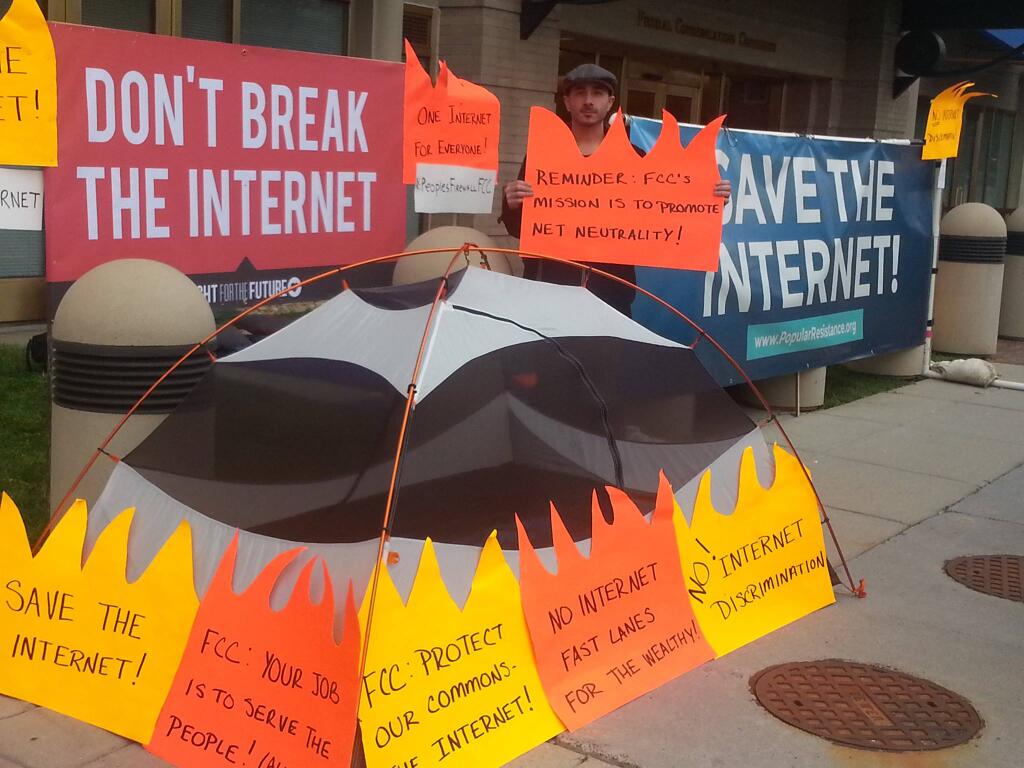On May 15th FCC chairmann Tom Wheeler officially unveiled his new ‘net neutrality’ proposal and the commission voted on a partisan 3–2 line to move forward with the proposal kicking off a three month public comment session before a final vote takes place (take action below). I recently wrote a very thorough rundown of the net neutrality issue and how the FCC got where it is today, and would encourage anyone reading this to read that piece as a primer (other great resources at the bottom of that page).
The New Rules
The final proposal titled “Protecting and Promoting the Open Internet NPRM” (official FCC video) covered several important areas around internet regulation.
Wireless
First, unlike the 2010 Open Internet Rules, this proposal opens up the possiblity of bringing wireless networks into the fold of regulation. The wireless exemption was one of the most laughable setions of the 2010 rules so it is a step in the right direction to consider that wireless internet is still internet (duh).
Transpaerency
The second area these new rules touch on is transparency. Here the commission puts forth another modest proposal that when ISP’s implement mechanisms that slow certain internet traffic down, or prioritize other types of online traffic, that they must share those policies publicly so that consumers know what the service they are paying for entails. Again, this part of the proposal is a small first step toward the most basic consumer protections, though knowing how crappy your Comcast service is may not empower you at all if there is no real competition in the market.
No Blocking
Third the commision creates a “no blocking” rule preventing ISP’s from blocking legal content online. However this rule seems pretty toothless since ISPs can simply slow down internet speeds for certain sites so that they are practically unusable, while not technically blocking them (the proposal recognizes this problem but offers no solution).
Filing Complaints
Fourth the proposal introduces a formal complaint system where the public can file requests for the FCC to invegstage ISP misbehavior. This is surely better than no such mechanism, but relaying on a slow reactionary framework to stop ISP abuse after the fact, is not the same as setting clear and enforceable rules to prevent ISPs from slowly molding the internet into a profit maximizing entity for themselves.
Paid Prioirizaion (aka Fast Lanes)
Finally the most controversial section that these rules take up is the issue of “paid prioritization”. This is essentially the idea that ISPs like Comcast could service some websites faster or slower than others creating internet “fast lanes” and “slow lanes”, and of course charging websites extra to use the fast lane. This fundamental shift would cause lots of problems for consumers (examples). While Chairman Wheeler has said time and time again that there should be only one an internet..
I don’t like the idea of the internet divided between haves and have-nots. I will work to see that doesn’t happen.
There is one Internet. Not a fast internet. Not a slow Internet. One Internet.
..the proposal does not ban paid prioritization outright and uses some some tricky language like “Rebuttable Presumption” to leave loopholes wide open for ISPs to begin discriminating and prioritizing traffic.
The Reaction
The Government
Most of the harshest reaction was written after the initial proporsal draft leaked in mid April, you can see a full rundown of that reaction in part one of this post. However after the commission voted on May 15th to move forward with the proposal another, smaller, wave of responses were issued. Senator Al Franken, who has been working on the net neutrality issue for sometime and was one of the first Congressmen to make his voice hear when the draft proposal leaked put out a statement saying…
Today’s vote could spell the beginning of the end of the Internet as we know it, plain and simple. Because of net neutrality, the Internet has been a tremendous platform for innovation and connectivity. But the FCC has taken a woefully misguided step toward handing the Internet over to big corporations who can pay boatloads of money for preferential treatment. Anyone who values a free and open Internet should be deeply troubled by the FCC’s vote, and I plan to do everything I can to convince them that they need to change course.
-Senetor Al Franken (D‑MN)
The White House also chimed in with a small statement that said in part
…Chairman Wheeler has said his goal is to preserve an open Internet, and we are pleased to see that he is keeping all options on the table…
-The White House
This statement of course is alluding to the fact that the FCC could decide to reclassify broadband internet as a Title II common carrier which would give it all the regulatory authority it needed to truly enforce net neutrality.
Tech Companies
Several tech companies also released statements voicing their concerns
Consumers should not be denied highest quality access to the content of their choice because of discriminatory deals cut by their broadband Internet access provider. A strong non-discrimination rule is needed.
-Amazon
We remain concerned that the proposed approach could legalize discrimination, harming innovation and punishing US consumers with a broadband experience that’s worse than they already have.
-Netflix
Bijan Sabet, an investor of Twitter, Tumblr, and Foursquare gave this strongly worded reubuttle of the FCC’s new rules
I’m in shock the FCC would favor special interest groups over an open internet that does not discriminate over the bits that flow over the network. It’s simply unacceptable to allow a few large corporations the ability to control content, media and information
-Bijan Sabet
Rock Bands?
Pop culture weighed in when over 50 bands signed onto a letter saying in part…
…Under these rules, telecom giants like AT&T, Comcast and Verizon would be able to pick winners and losers online and discriminate against online content and applications… Unless the Commission restores strong nondiscrimination protections based on a solid legal framework, creativity, cultural commerce and free expression will suffer. Your proposed path would open the door to widespread discrimination online. It would give Internet service providers the green light to implement pay-for-priority schemes that would be disastrous for startups, nonprofits and everyday Internet users who cannot afford these unnecessary tolls
Public Interest Groups
Public interest groups also seemed critical of the new rules
An open Internet levels the playing field in our democracy and that’s why it’s so alarming that the FCC is moving forward Chairman Tom Wheeler’s proposed rules that would break President Obama’s promise to uphold Net Neutrality — rules that could destroy the Internet as we know it.
-Victoria Kaplan of MoveOn.org
The FCC’s proposal still falls well short of real net neutrality rules. It would create a two-tier internet where “commercially reasonable” discrimination is allowed on any connections that exceed an unknown “minimum level of access” defined by the FCC. A two-tier internet is anathema to a truly open internet, and rules under section 706 authority are insufficient to prevent harmful paid prioritization.
Protecting an open Internet, free from discriminatory or anti-competitive actions by broadband gatekeepers should be the cornerstone of Net Neutrality policy. The Internet Association will advocate for the FCC to use its full legal authority to enforce rules that lead to an open Internet —nothing should be taken off the table as this discussion evolves.
-Michael Beckerman of the Internet Association
Again, like the White House, these last two statements allude to the power of keeping the option of Title II reclassification on the table.
Internet Service Providers
However not everyone was in favor of strong net neutrality rules. The ISPs followed up their May 13th letter warning of the dangers of Title II reclassification with individual statements…
…any proposal to reclassify broadband Internet access as a telecommunications service subject to Title II of the Communications Act would spark massive instability, create investor and marketplace uncertainty, derail planned investments, slow broadband adoption, and kill jobs in America.
-Comcast
…For the FCC to impose 1930s utility regulation on the Internet would lead to years of legal and regulatory uncertainty and would jeopardize investment and innovation in broadband.
-Verizon
These telecom complaints from the other side of the issue continued to harp on the same three arguments against net neutrality that the ISPs have been using for year.
First they claim it would “kill jobs” due to a lack of private investment, though there is no evidence that increased telecom regulation would lead to a loss of investment. Second they say it would lead to years of litigation and legal uncertainty. This is perhaps the most disingenuous argument since it is the telecom providers themselves that would be initiating the lawsuits and challenging the legal regime at every turn (the way Verizon sued and destroyed the original 2010 net neutrality rules). Finally telecoms argue that there would be huge political back;ash in establishing stronger net neutrality rules. Again this argument hinges on the fact that it is ISPs themselves that heavily lobby Congress to react this way.
As an aside it is worth noting that true believers on the libertarian side also oppose stronger FCC net neutrality rules.
*More quotes and reactions here
ACtivists Fight for Net Neturality
Of course internet advocates aren’t taking any of this news lying down as the real battle for net neutrality is just beginning as the FCC opens up the proposal for a 60 day public comment period. And it’s not only traditional internet freedom fighters who are getting involved. Recognizing that an open internet is an indisposable platform for organizing political change, outlets like ColorLines, Feministing, Hip Hop and Politics, Presente.org, Bitch Magazine (2), and my own local Representative Raul Grijalva, have all put out the call to raise awareness about the net neutrality issue.
In the lead up to the May 15th vote an Occupy the FCC encampment emmerged outside the FCC’s offices. Perhaps due to the FCC’s sympathies with net neutrality advocates, or perhaps because of being unable to physically avoid protesters, FCC commissioners and employees have come out to the encampment and engaged with protester reportedly even “high-fiving some members of the group in solidarity”.
Ha! @TomWheelerFCC visits #OccupyTheFCC People’s Firewall camp for photo op, looking oh so attentive… #WaveOfAction pic.twitter.com/eO3kG9Y7Q7
— Wave of Action (@WaveOfAction) May 14, 2014
On the day of the vote hundreds of protestors gathered outside of the hearing. While at least three protestors were escorted out of the hearing itself after causing disturbances.
Click on the images above to see full size. More images here.
Congress Tries to Exercise Oversight
On may 20th the U.S. House of Representatives’s Subcommittee on Communications and Technology under the Committee on Energy and Commerce held an FCC oversight hearing where chairman Wheeler was hauled before the committee as the soul witness. Full video of the hearing can be found here, as well as Tom Wheeler’s prepared remarks.
Republicans
The hearing quickly fell upon partisan lines with all the usual arguments on both sides. On the Republic side Representative Bob Latta from Ohio warned against over regulation…
This policy would be an extreme example of government overreach
Rep. Greg Walden added to this sentiment…
The practical consequences of reclassification are to give the bureaucrats at the FCC the authority to second-guess business decisions and to regulate every possible aspect of the Internet.
-Rep Greg Walen
Walden also invoked the argument that Title II regulation is to outdated to be used. But what about Telecommunications Act of 1996 which is what the current weaker FCC rules rest on? And who’s fault is it that newer legistaltion hasn’t been passed? (Unrelated: Congress hasn’t passed an update to the Electronic Communications Privacy Act that since 1986 [video]).
Title II of the Communications Act—rules that find their roots in 19th century railroad regulation and were designed to regulate the world of a telephone monopoly—harken back to a world in which a twisted copper was the only portal for consumers to the communications network and voice was the only service.
The general freakout about common carrier rules from the telecommunications industry, and now from Republicans, are mostly debunked in this great Ars Technica piece “AT&T claims common carrier rules would ruin the whole Internet”. Just because the medium has changed from copper wire phone-lines, to coaxial cable lines, to mobile wireless signals, doesn’t mean that the principles of common carriage and anti-trust law don’t apply.
Democrats
On the other side of the aisle Democrat Henry Waxman lead the charge of illuminating the loopholes in the current plan. Rep. Waxman noted that only paid prioritazation of “affiliated services” would be presumed illegal by the FCC and asked chairman Wheeler why the rules don’t ban paid prioritization outright. Rep. Waxman also echoed an argument made by legal scholar, author, and my personal hero, Tim Wu, that the FCC should do what Congress does frequently when it “pass[es] laws under more than one basis of authority, to best insure the law’s survival”. As Rep. Waxman put it…
You shouldn’t water down the open Internet rules to fit section 706. Instead, you should get the substance right and invoke Title II as an independent basis of authority
-Rep. Waxman (D‑CA)
Tom Wheeler
However the biggest take away from the hearing was Wheeler’s continued inability to state his proposal in clear terms. For example he could not give a straight answer to Rep. Anna Eshoo’s (D‑CA) question…
As a policy, not as a legal question, do you think that paid prioritization should be blocked outright?
…leading her to rebut in frustration
Just answer my question. Just tell me, do you think that it should be blocked outright?
The line Wheeler is walking makes it seem like he is avoiding taking sides and is simply kicking the can down the road, which essentially is what it means to evaluate cases on a “case by case basis” as Wheeler’s rules propose.
Take Action!
The most important thing is none of these rules are yet final and there is a public comment period until July 15th. There is a very real possibility that, like with the outcry over SOPA and ACTA, that the public can have a real impact, and can force the FCC to adopt a stronger set of rules or even reclassify broadband providers to Title II common carriers. Even ONE email, or ONE phone call can make a difference, seriously!
The Electronic Frontier Foundation has created a DearFCC.org page that makes it eeeeaaaassssyyy to submit your comment and make your voice heard.
Other great and easy ways to make your voice heard are…
- DearFCC.org
- Save the Internet: What Can I Do
- Official FCC Comment (directions)
- #StopTheSlowLane
- FreePress Petition
Further Reading/Materials
Great Overviews/Breakdowns
- NY Times — F.C.C. Backs Opening Net Neutrality Rules for Debate
- Ars Technica — FCC votes for Internet “fast lanes” but could change its mind later
- Washington Post Q&A
- Vox: Everything You Need to Know about Network Neutrality
Interesting Analysis
- Huffington Post: Verizon, Be Careful What You Wish For
- Ars Technica: The FCC doesn’t have to authorize Internet fast lanes—they’re already legal





No Comments